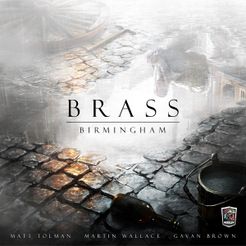‘Brass’ is a boardgame that I have been interested in
playing for a while due to its reputation. This Sunday we finally got to play ‘Brass
– Birmingham’ with Val and Chris. There is a lot going on in the game and many
possible paths to riches and victory. The range of actions open to a player is both
limited and straight forward, but the options available is much wider and
frequently depends on what others have done and the positions on the map. Which
of the three manufacturing industries do you wish to invest in? Will you
concentrate on building a good network? Do you put your money into coal or
steel, or beer? When do you get a loan so you can invest in your empire? Do you
trash lower status factories to enable you to invest in possible better
facilities later? Do you build early before another player snatches towns away
from you? Decision making in this game is tough, and players who suffer from
analysis paralysis will struggle and slow the game down! The game also splits
nicely into to two, with the canal era being followed by the rail era. The
board is partially re-set, and the parameters for establishing a network change
so that coal is a more important resource. In our game beer was the limiting
factor in the canal era, and for me, the beer mechanism seemed a bit strange
thematically although I can see that it is necessary for game play. The card
play is good and provides a time/clock mechanism for the game, and you only
have a few turns to accomplish what you want to do.

Our game took ~3 hours to complete, which seems like a long
time but game play is reasonably fast and you become so absorbed that time
passes un-noticed. I had a healthy lead in terms of victory points at the end
on the canal era, but my income was low and I had ignored building potteries
(which can yield large victory points). I therefore entered the rail era with
some trepidation! In the second half of the game Chris came storming forward,
upgrading his potteries and utilising his coal production to good effect to construct
a good rail network. Val and Elaine both had good income streams, and I felt I
was struggling financially. Elaine and I had to leave before the final scores
were calculated, and I was sure I had come last. It turned out that Chris won
with 123 points, I was only just behind on 120 points, Elaine was third with
100 points and Val came in last.
On reflection, I can see why Chris won but am not sure
why/how I managed second place. I felt both Elaine and Val had played better
than me in the second era, and I don’t think my success early on would result
in a high score at the end.
Both Elaine and I really enjoyed the game. It
makes you think and you are constantly interested in the actions of the other
players. As a result I am thinking of buying my own copy of Brass. I think I
might buy the ‘Lancashire’ version, which has some differences in rules and
geography, but still has the same core mechanics. The ‘Birmingham’ version
appears to be rated by gamers as the better of the two, but I would prefer not
to duplicate Chris’s game collection. My only negative criticisms of the game are
(i) the dark artwork, but I suppose this is to convey the black, satanic mills
of the industrial revolution Black Country, and (ii) the ‘night’ board on the
reverse of the ‘day’ board. I can’t see the point of this, surely the
publishers would have been better advised to use a different area of the
country, or maybe, simply combine the two games (‘Birmingham’ and ‘Lancashire’).
This comment has been removed by the author.
ReplyDeleteUnfortunately the images didn't appear, hence the repost.
ReplyDeleteAt the end of the Canal Era Mark was the only player who had flipped level two industries on the board (meaning they would score again at the end of the Rail Era). Elaine and I had coal on the board ready for the age of steam and Val had unfortunately just missed out on flipping a cotton mill.
Mark scored a lot of points for his network at the end of the Rail Era, including for connections to other people’s industries (essentially not having to pay to build the industry that his points were coming from). He also had the most number of flipped industries on the board at the end of the game. Income probably hurt a little as coal got prohibitively expensive preventing a last turn splurge of tiles to eek out a few more points.
Both Elaine and managed to place potteries, but I managed to get the level 5 out which scored twenty points on its own. My rail network also scored well which helped me in the end.
It was a fun game and glad everyone enjoyed it. I think we had one minor rules blooper which we played correctly sometimes and incorrectly at others. Basically you consume resources after you place a tile, so you could place a rail to a source of coal (or to beer for a second rail).
Thanks for the comment. It was a great game and both Elaine and I were most impressed. Hopefully Santa will get us a copy of Brass Lancashire.
ReplyDelete